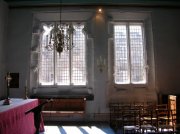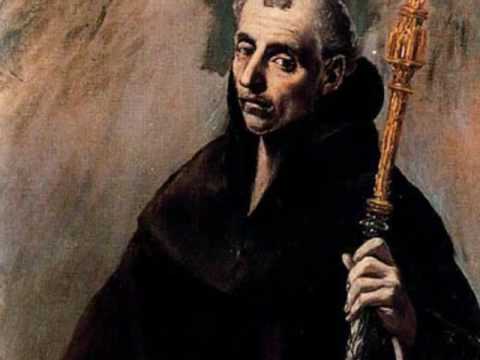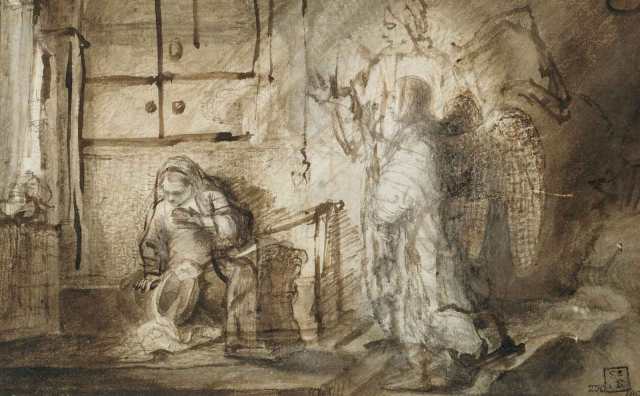My Sermon, Opening Service St Mary’s College, St Andrews September 2017

It is a pleasure to be here with you at this opening of a new academic year, in this ancient and sacred place, a time of new beginnings and opportunities. Welcome to all of you who are new here, to St Mary’s and the university, embarking on an exciting adventure. It is also a time for those of us returning to renew old friendships and for many, the first day of what will become very important friendships and relationships of all kinds. Also, I would say, it is a time to set out for ourselves our goals and aspirations for our personal lives, and I hope and urge you today that this should involve ways of thinking about what we hope to gain from our studies, and how do our studies relate to our lives as a whole, including our spiritual lives, the life of our souls.
Our first reading today gives us an idea, the beginnings of a program of our course of life. It puts before our eyes the great Solomon, who though by no means perfect in his later life choices, and all too human, mistakes and all, is remembered for how he responded to God when asked a very important question. As we just heard, Solomon very famously when offered his choice of gifts from God, asks for the gift of Wisdom, and in so doing sets up a model of what all those in responsibility should ask for and aspire to.
What is Wisdom? This is a big question!
While it often depends on knowledge, it is not merely the same as that. Computers can contain limitless knowledge, but they are not wise. Memorizing math tables, historical dates, or sports statistics, can give us a type of knowledge, but in itself is not wisdom. Experience when added to knowledge can bring a certain sort of wisdom, but only if we actually heed it and learn from it. Learning the Creeds and catechisms, memorizing the names of all the books of the Bible and even being able to quote from them, does not in itself make us wise. Medieval thinkers spent much time explaining the difference between mere knowledge of a type, and true wisdom. We certainly could turn to many of the world’s great religions, to the Greeks and Romans, to Buddhism and Taoism, to Islam and Hinduism, to tales of Odin in Norse mythology and the sages of Native Americans, for good definitions of Wisdom, and how to make our way in the world and avoid foolishness.
But what about our friend Solomon? According to King Solomon, as tradition records it in the biblical Wisdom literature, basically wisdom is gained from God, “For the Lord gives wisdom; from His mouth come knowledge and understanding” Proverbs 2:6. And through God’s wise aide, one can have a better life, marked by good conduct: “He holds success in store for the upright, he is a shield to those whose walk is blameless, for he guards the course of the just and protects the way of his faithful ones” Proverbs 2:7-8. “Trust in the LORD with all your heart and lean not on your own understanding; in all your ways submit to him, and he will make your paths straight” Proverbs 3:5-6.

There are various verses in Proverbs that contain parallels of what God loves, which is wise, and what God does not love, which is foolish. For example in the area of good and bad behaviour Proverbs states, “The way of the wicked is an abomination to the Lord, But He loves him who pursues righteousness (Proverbs 15:9). In relation to fairness and business it is stated that, “A false balance is an abomination to the Lord, But a just weight is His delight” (Proverbs 11:1; cf. 20:10,23). On the truth it is said, “Lying lips are an abomination to the Lord, But those who deal faithfully are His delight” (12:22; cf. 6:17,19). These are a few examples of what, according to Solomon, or those who passed down his teachings, are good and wise in the eyes of God, or bad and foolish, and in doing these good and wise things, one becomes closer to God by living in an honorable and kind manner.
And famously in the book of Ecclesiastes, the sage concludes that all life’s pleasures and riches, and even wisdom, mean nothing if there is no relationship with God.
The Epistle of James is often said to be the New Testament version of the book of Proverbs. It reiterates Proverbs message of wisdom coming from God by stating, “If any of you lacks wisdom, you should ask God, who gives generously to all without finding fault, and it will be given to you.” James 1:5. James also explains how wisdom helps one acquire other forms of virtue, “But the wisdom that comes from heaven is first of all pure; then peace-loving, considerate, submissive, full of mercy and good fruit, impartial and sincere.” James 3:17. In addition, James focuses on using this God-given wisdom to perform acts of service to the less fortunate. So the fruits of wisdom are very desirable, and should show themselves in our own behavior, including how we treat others.
Fair enough, but where does this relationship with God come from? How do we find it in our lives?
If we seek to be truly wise, while doing so, never cease to pray for it.; take your studies seriously; find good mentors, among the staff and your friends, among pastors, and among great and perennial books. There are so many voices now, especially with the internet. It becomes crucially important to pray for discernment to evaluate what you are hearing and learning, and how to apply it to questions that matter for you and the churches and the world.
I have found much wisdom in the life and teaching of a great monk Benedict of Nursia, the author of a rule for monastic life that would have a profound effect on the church and all of western culture. He knew a few things about cultivating wisdom. He knew that it came with a balance of prayer with others, or liturgy; prayerful reading of the Scriptures, meditating on them and making them our own; and useful work and wholesome recreations. There is much wisdom in such a balance for all of us, whether students or staff, and I will come back to this in a few minutes.

St Benedict in his famous rule exhorts us to listen to the words of the master, and we should do that. But we also must be open to wisdom when it comes from unexpected places, as this same Benedict cautions us that we must listen even to the voices of those who are junior in the monastery. Our staff must be open to the voices of their students, and perhaps, dare I say it, even be prepared to find wisdom there!
Most importantly, Benedict ultimately exhorts us that we must seek wisdom in Scripture, as he puts it: what word of the NT and OT is not full of guidance for life. To turn knowledge of Scripture into wisdom, we must first have the knowledge. But that is not enough! For then it must be joined with humility, and most all charity. A wise teacher I admire greatly was Walter Hilton, a great English spiritual teacher of the 14th century; he was an Augustinian canon, who lived a form of religious life very similar to the canons who lived and worked and prayed in St Andrews cathedral a few hundred feet from us right now. Walter Hilton was known as a great spiritual advisor, and, following the teachings of St Paul, he had this to say about the way knowledge of Scripture becomes wisdom when approached in the right Spirit, in prayerful attentiveness to the grace of God :
“Learned men and great scholars have devoted great effort and prolonged study to the Holy Scriptures… employing the gifts which God gives to every person who has the use of reason. This knowledge is good … but it does not bring with it any spiritual experience of God, for these graces are granted only to those who have a great love for Him. This fountain of love issues from our Lord alone, and no stranger may approach it. But knowledge of this kind is common to good and bad alike, since it can be acquired without love, … and men of a worldly life are sometimes more knowledgeable than many true Christians although they do not possess this love. St. Paul describes this kind of knowledge: “If I had full knowledge of all things and knew all secrets, but had no love, I should be nothing.” … Some people who possess this knowledge become proud and misuse it in order to increase their personal reputation, worldly rank, honours and riches, when they should use it humbly to the praise of God and for the benefit of their fellow Christians in true charity… St. Paul says of this kind of knowledge: “Knowledge by itself stirs the heart with pride, but united to love it turns to edification.” By itself this knowledge is like water, tasteless and cold. But if those who have it will offer it humbly to our Lord and ask for His grace, He will turn the water into wine with His blessing.”

Walter Hilton
For the Christian ultimately, knowledge joined to humility and charity becomes wisdom when it is sought from Christ, centered in Christ, and lived in obedience to how Christ wants us to live, overflowing and transforming our relationships with those around us, our neighbors.. Over 300 years ago, a New England poet and pastor, Reverend Edward Taylor, served for decades in what was then the wilderness of the Connecticut River Valley in Westfield, Mass. He wrote many poems on the Eucharist and saving power of Christ, drawing deeply not only on his own Reformed and Calvinist context, but on themes that had deep roots back through the middle ages and into the Church Fathers.. In one sermon given to his frontier congregation he spoke of wisdom this way, using homely images but also the image of the fountain which we just saw in Walter Hilton:
“There is a natural desire of Wisdom as an Essential Property of the Rational Nature…And in great desires of these Treasures of Wisdom betake yourselves to Christ to partake of them. Where should the hungry man go for good but to the Cooks shop? Where should the thirsty go for water except to the Fountain? No man will let his bucket down into an empty well if he be aware of it. No man will seek riches in a beggars cottage. He that would be wealthy must trade in matters profitable. So if thou wouldst have spiritual treasures, trade with Christ. Wouldst thou have Heavenly Wisdom? Go to Christ for it.”

Let us then go to Christ, who is Love and who indeed is Wisdom incarnate. And what today did Wisdom tell us, in the Gospel, as the Eastern Orthodox liturgy proclaims, before the Gospel is read, “Wisdom! attend!!”
Our gospel reading today, the words of Wisdom incarnate, delivers to us the warning against rash judgment of others, reminds us of the need to practice self awareness of our own faults, and to concentrate on those, rather than spending our time and energy complaining about what is wrong with everyone around us.
Instead, we are invited and indeed exhorted to assume a posture of graciousness, and hospitality; This does not mean a suspension of common sense and a listless, passive acceptance of evil. But what it does call for is a realization of the need to treat others with compassion and understanding, much as we would like others to treat us. This is Wisdom speaking, this is the Golden Rule, the foundation upon which we must build our lives in community,. This is wisdom, the summation of the Law and the Prophets; This, taken even further and joined with charity and forgiveness, is what Jesus commands us to do, instructs us on how to behave if we expect our own prayers to be heard, if we expect our own faults to be forgiven, and to make any advance in the spiritual life. To be wise we must indeed begin with the starting point of the Golden Rule, enlarged and transformed and deepened by the power of the Holy Spirit.
This can be hard, especially with all of the stresses of life. It is hard to keep ourselves centered in Christ, to keep our spiritual equilibrium. We must take steps, at all times asking God’s help and grace, to have a life organized in such a way that allows us to make room to cultivate authentic wisdom, to allow us to see God in ourselves, in our neighbor, and in our work and studies. Let me end today by giving a few suggestions on how to do this, which are not original to me, but instead take us deeply into the tradition for guidance, back to Benedict whom I mentioned before.
For Benedict, a life centered on God, involved being attentive to our own spiritual needs and the needs of those around us. He truly felt that at the heart of spiritual life and wisdom was the profound idea that we need to respect and listen to others in our spiritual lives, particularly those with more experience. We have to sincerely believe that what other people have to say can really help us. As the gospel tells us today, we do not sit in constant judgment on others, eager and willing to pounce on their words and criticize them; but rather we should listen to them with an attentive regard, allowing the Holy Spirit to work on us through their words, and become a part of our own process of spiritual growth and discernment, in other words to help us grow in true wisdom.
Benedict suggested a way of dividing the day up that allows us to have spiritual balance, to keep us from getting burned out and also to keep us from neglecting what is important. First of all we must make time in our week to pray with others, for the liturgy and common prayer. This includes making sure that every day, not just on Sunday, we make at least some time, preferably the morning and evening, to offer up our prayers to God, in communion with those doing so throughout the world. Secondly, we must make at least a small amount of time for Spiritual reading, a prayerful reading of Scripture or some other worthy text. This ensures we are not just staring at ourselves, but rather attentively listening to God speak to us through his Word. This will renew and nourish us. As one church father put it, “If a person wants to be in God’s company, he must pray regularly and read regularly. When we pray we talk to God; when we read. God talks to us. All spiritual growth comes from reading and reflection; By reading we learn what we did not know; by reflection we retain what we have learned.”

And finally, and not least, there is our work. We all have jobs and responsibilities, including the work of being a student and teaching and research and administration. We all must do our work, and the important thing is that this work be done in a sprit of offering it as a gift to God. Benedict says we must begin all our work with a prayer, not a bad practice for us to emulate. Whatever our work is, if done in the proper spirit, like reading and praying and liturgy, it becomes a type of prayer. In this way our work, our tasks for the day are not something that are keeping us from doing something else, but are themselves the stuff of holiness, opportunities to grow in love of God and neighbor, to be holy, to be truly wise. And to be better at this, we must be sure to balance our work with healthy recreations.

So ask for God’s help in the coming year to balance all of these needs, to find meaning in our work, studies, and relationships, to find God and Christ in all we do and aspire to, and in this way to pursue the wisdom that really matters. And as we strive to do this together, we can join each day in the prayer of St Benedict, “let us prefer nothing whatsoever to Christ, and may he lead us to everlasting life.” Amen.

















